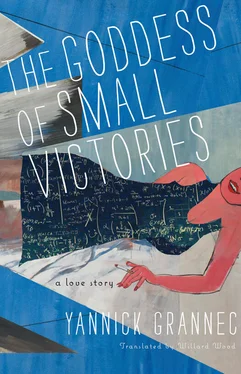When I was younger, I was afraid that some stroke of evil might fall on us like a war club. I bargained with fate to spare us, not realizing that the blow had already fallen. Misfortune isn’t so horrendous when it comes slowly. It anesthetizes you; it numbs your senses so as to seep in unrecognized. I hadn’t kept his illness from progressing; I had refused to watch the child grow up. Others say: “How that child has grown!” But for the mother, growth is barely perceptible, except when a pant leg is suddenly too short or, in Kurt’s case, when a suit becomes too big. In an intimate relationship, madness is invisible, madness is denied. It’s an insidious disorder that destroys a person quietly, in a long decline, until there has been one crisis too many and reality attacks your denial and takes from you everything you had thought to protect. And then everyone around you says, “Why didn’t you do anything?”
I spent a long moment watching his spasmodic sleep. He was curled up around his pain, his fists clenched against his stomach. I pulled up the sheet, which had slipped down over his wasted body. I hadn’t seen him naked for years. I looked at this once familiar body, its thin legs, its useless penis. Of the body I had loved, caressed, cared for, nothing was left but the structure. I could see the shape of his skull. The man was gone and all I could see was his skeleton; already I was looking at the memory of him.
There wasn’t a drop of courage left in me. I lived inside a fat, dried-out old woman. My entire being told me to give up the struggle. I was enormous, and he was transparent, as though I’d sucked up all his flesh. But it was in fact he who had worn me down, who had used me as an extra battery. These last years seemed to have gone on forever. I hadn’t had children. I would leave no work behind. I was nothing. I was only suffering. I couldn’t even show my weakness, or he would sink even further into depression. When I’d been admitted to the hospital, he had refused to eat. If I let go, he would let go. What was the point of going on like this? He never went out anymore. He gave appointments at his office but never showed up. He communicated with people only through a “safe” intermediary. No one was surprised any longer at the caprices of the reclusive genius. The only visits he tolerated were those of Oskar and his son. Young Morgenstern wanted to become a mathematician. Kurt liked to talk with him. How could he be a model for this kid? Who would want to end up like him? He hadn’t attended his own mother’s funeral in 1966. I’d had to go instead. Of all the ironies! “Why should I stand for a half hour in the rain in front of an open grave?” was his excuse.
If I died before he did, would he come to my burial? Oskar should have brought him the cyanide. A poisoned apple for two, it was the perfect solution: 220 plus 284, we would have closed the circle. And I could know for certain that he would be on hand for my funeral.
I went back into the living room, supporting myself along the walls. I collapsed into a chair; I would need to beg someone for help to get out of it again. The three men looked at me in silence. They’d have been perfectly happy to send me to the psychiatric clinic too. I would have to surrender. I was empty. Huge and empty.
“Do what you have to do.”
“You’re making the right choice, Adele. He needs psychopharmacological treatment.”
“And we’re going to find a home health care worker for you, Adele. You can’t go on like this alone.”
“You’re showing up late today, dear girl. Have you found other diversions?”
Anna balanced her handbag on the leatherette chair. She had made the trip reluctantly after working all day. There was a duty she needed to perform as quickly as possible, which was to tell Adele about Calvin Adams’s decree. She wanted to punch her fist into the wall every time she thought of him. She should have given him a piece of her mind straight to his face, and she should never have smoked that cigarette. Ever since, she’d had the hardest time not running out and buying a pack. She cursed the stiffness in her neck and shoulders. Her night with the Frenchman hadn’t managed to relax her. Though he also deserved a Fields Medal in that department. He had taken his leave very early to go back to work, his inspiration recharged, but not before suggesting a resumption of their proof of perfect compatibility. She had breakfasted alone, considering the framed von Neumann graffiti over the sideboard. And her fate as a sailor’s wife.
Mrs. Gödel suggested that Anna brew herself a cup of chamomile, taking no other notice of Anna’s unwonted moodiness. Anna flipped on the electric kettle and found the box of herbal tea. She turned up the volume on the radio: “Watching the Wheels” soared into the room. All the radio stations had been broadcasting John Lennon songs nonstop since he was shot and killed the night before.
Anna carefully carried the two steaming cups to Adele’s bedside table and installed herself in the blue chair. The old woman offered her a plaid blanket, and Anna wrapped herself in it.
“My grandmother would have been eighty-eight years old today.”
“I’ll pray for her.”
“She died a long time ago.”
“Prayers never go to waste.”
Anna burned her tongue sipping the tea. For others as well, December 9 would be a day of mourning. The radio endlessly rehashed the events at the Dakota.
“Have you noticed, Adele? We celebrate the birthdays of average men and women, but the date of death of celebrities.”
“I remember Kennedy’s assassination in ’63 very clearly. Everything in this country stopped. The world came to an end.”
“Are you sorry that your husband was never famous, like his friend Einstein?”
“Kurt never could have withstood the pressure. But he was not entirely overlooked, despite his moaning and groaning! When he received his honorary degree from Harvard, a newspaper ran the headline ‘Discoverer of the Most Significant Mathematical Truth of This Century.’ I bought twenty copies of the paper!”
“I read an article in Time where he was mentioned as one of the hundred most important figures of the century.”
“That list also included Adolf Hitler. I prefer to forget all about that one.”
“Hitler changed History too. To reflect himself.”
“I don’t believe in the devil. Collective cowardice, yes. It is the most widely shared human trait, along with mediocrity. And I include myself, don’t worry!”
“You’re far from mediocre, Adele. And I find you enormously courageous. I can’t flatter you about your hair because I’ve never seen it.”
The old woman smiled at her bright pupil. Anna had been glad to see that the turban had reappeared, newly cleaned. She pulled the blanket up under her chin; she still felt cold. She’d taken a chill when she emerged from the swimming pool earlier that morning. Adele confessed to her once that she had never learned to swim. She wasn’t about to console her with the stock “there’s always time” that is so often tendered to the old. There wasn’t time. She still didn’t know how to break the news to her. She thought of Leo; she would make amends by telling Adele about their discussion in the kitchen.
“Did you ever meet the mathematician Alan Turing?”
“I remember a conversation about his death. Kurt asked if the man was married. It seemed highly unlikely to him that a married man would commit suicide. Don’t look for any logic there. Everyone was very embarrassed. Turing was widely known to be homosexual, but my husband never paid any attention to gossip. I, on the contrary, love gossip! And you are not giving me much to go on, young lady. Who will you be spending Christmas with?”
Читать дальше












